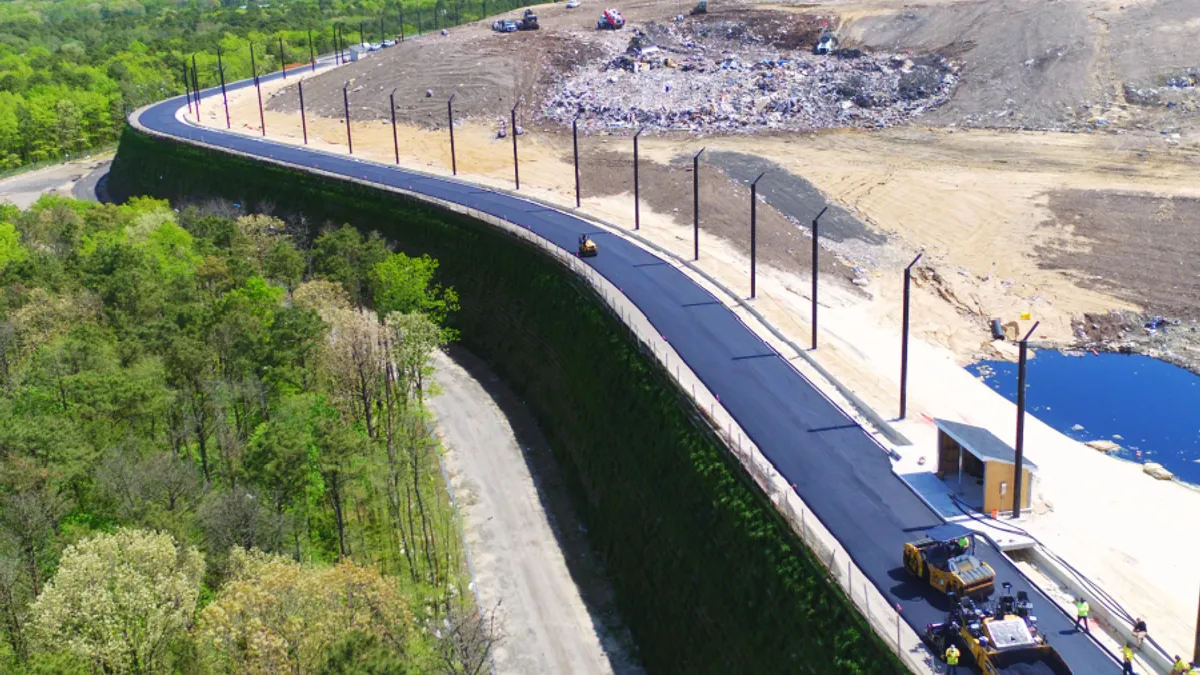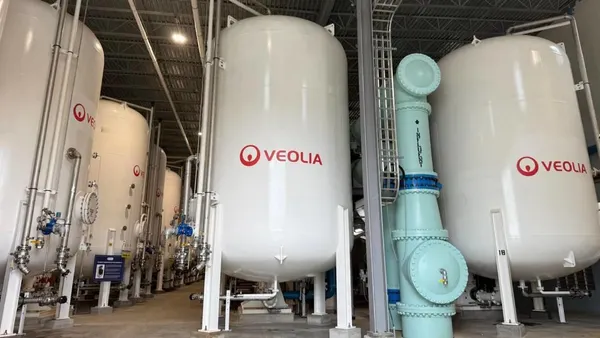Dive Brief:
-
New Jersey’s Atlantic County Utilities Authority has selected three vendors to bid on a waste conversion contract at its environmental park in Egg Harbor Township, the agency announced in January. EnviroPower Renewable Development; Juno, a Georgia-Pacific subsidiary; and MBL Technology will be able to bid on ACUA’s request for proposals once it’s released.
-
The announcement comes amid changes to the way the county manages its waste. Last year, ACUA unveiled a partnership with South Jersey Industries and Opal Fuels to capture landfill gas and convert it to renewable natural gas at the authority’s 102-acre landfill. The authority is also exploring anaerobic digestion, ACUA President Matthew DeNafo said in an interview.
-
ACUA plans to issue its RFP to the vendors by the end of the second quarter. DeNafo said a final contract with the chosen vendor could have a 20-year to 25-year term.
Dive Insight:
The initial request for qualifications, which ACUA published in August, detailed the authority’s desire to commission a facility that could handle up to 1,000 tons of material per day for up to 25 years. It listed a range of potential technologies as eligible, including pyrolysis, gasification, hydrolysis, mechanical sorting or a combination of technologies. ACUA stated a preference for technologies that produce refuse-derived fuels that either are consumed on site or can be beneficially reused.
Georgia-Pacific’s Juno uses a proprietary autoclave technology and anaerobic digestion for its process. The company opened a 70,000-ton facility in Toledo, Oregon, in 2021, per its website.
Juno President Christer Henriksson said the company’s technology “tripled” Toledo’s landfill diversion rate, and Henriksson said it could similarly boost Atlantic County’s sustainability while “supporting the State of New Jersey’s recycling objectives.”
"Juno presents a potential transformative opportunity for Atlantic County to implement a solid waste diversion solution and lead the way in resource recovery,” Henriksson said in an emailed statement.
MBL Technology uses what it calls an advanced mechanical sorting process. It is the only selected bidder based in New Jersey, Managing Member Matthew Linda said in an emailed statement. “Being shortlisted from many other vendors is an extreme compliment to MBL Technology and their leadership Team,” he said.
EnviroPower uses an air-fed gasification process. The company lists facilities in Canada and Scotland under development; the former is expected to produce ultra-low-sulfur fuel oil from imported refuse-derived fuel. EnviroPower did not respond to a request for comment.
ACUA has operated several waste management facilities at its environmental park since the 360-acre site began operation in 1990. Today, the site encompasses a windrow composting facility for green waste, a transfer station, a recycling processing center and the landfill. The authority also operates a wastewater treatment facility in Atlantic City.
The landfill currently has permitted capacity through 2028. While that deadline is close, DeNafo said it wasn’t the primary motivation to build a new waste conversion facility. He said ACUA is evaluating a small vertical or horizontal expansion, both of which would add about five years of capacity to the site.
“We have a couple other irons in the fire,” DeNafo said.
ACUA first began investigating waste conversion technologies in 2008 and struck a partnership with energy company NRG to build a pilot plasma gasification facility shortly thereafter. But by 2011, securing air permits for the facility proved challenging, DeNafo said. A change in leadership and corresponding shift in priorities at NRG ultimately brought the proposal to an end.
Since then, DeNafo and other officials have toured several other waste conversion facilities, including Renovare’s West Virginia facility and Aries Clean Technologies’ biosolids gasifier in Linden, New Jersey. Delta Thermal Energy, a company which bid unsuccessfully on a Maine facility, also operated a small “benchtop” facility in ACUA’s transfer station, DeNafo said.
The RFQ excluded incineration or land application of biosolids. DeNafo said true incineration has become too difficult to permit in New Jersey, and the authority wanted “a good shot in getting this permitted.” Land application of biosolids was excluded due to recent concerns over contamination, although DeNafo said land application of a material produced by waste conversion technology was still a possibility.
While processes like gasification and pyrolysis have proven difficult to operate profitably in the United States, DeNafo said he was encouraged by jurisdictions like Toledo or Kent County, Michigan, which are pressing forward with a combination of technologies to meet their needs. He said ACUA officials are actively exploring anaerobic digestion to complement the potential waste conversion facility, and the authority could begin accepting organics in its Egg Harbor composting facility as well.
Atlantic County, like most New Jersey counties, also has a flow control ordinance, which means ACUA manages all MSW coming from the county. In 2022, that totaled more than 96,000 tons of waste, and the county has surpassed 100,000 tons of waste a year multiple times in recent years.
The county’s dedicated waste stream should be attractive to private partners looking for a good place to implement their technology, DeNafo said.
“That protection of that franchise adds strength to bring a partner in to know that there's guaranteed waste,” he said. “If a company decides that they want to invest $200 million in an area, knowing that there’s waste flow there that they can guarantee that waste certainly is appealing.”











